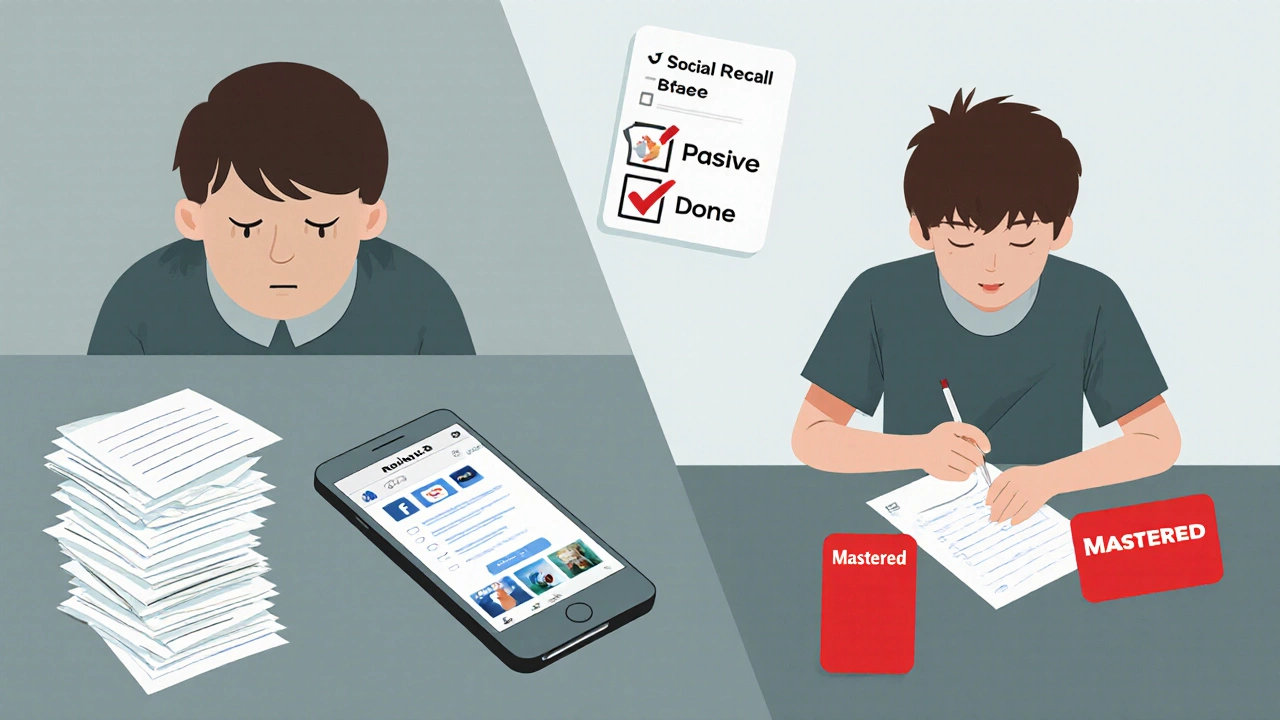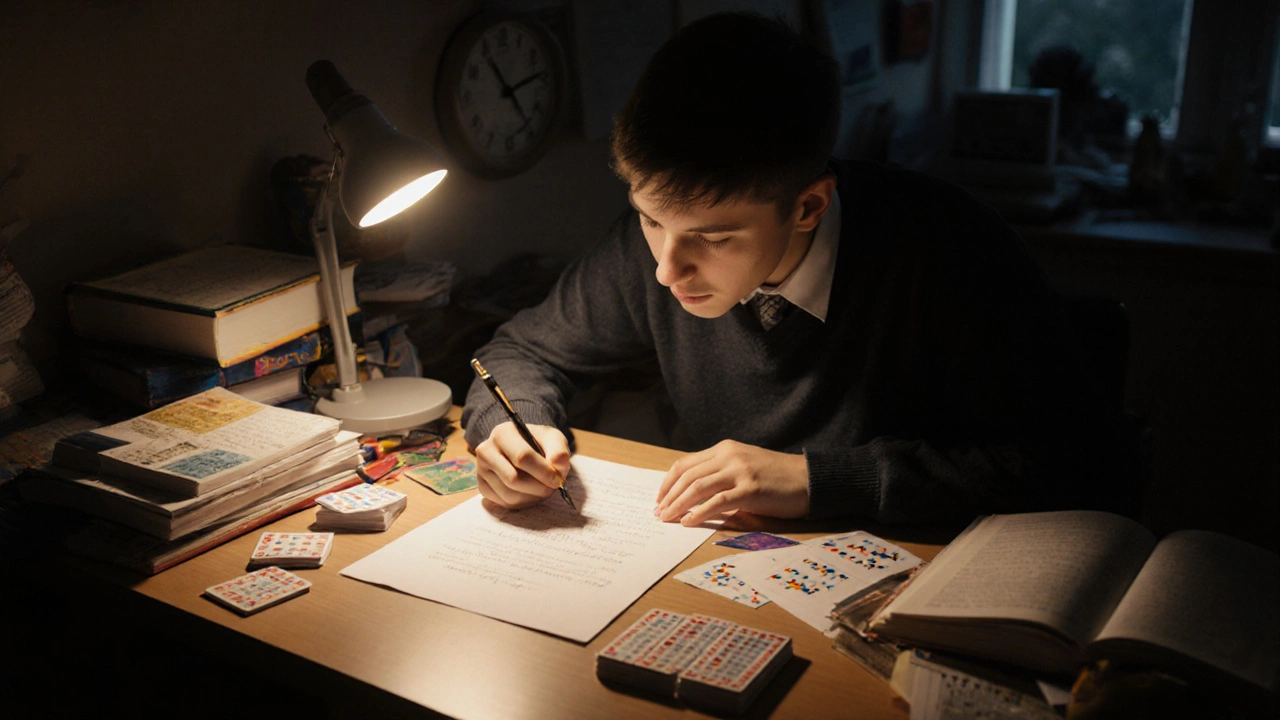You’ve got a GCSE exam tomorrow. You’ve got one hour. Is that enough? The answer isn’t yes or no-it’s it depends. One hour won’t save you if you’ve done no work all term. But it can make a real difference if you’ve already done the hard yards and just need to lock in what you know.
What One Hour Can Actually Do
One hour of focused revision isn’t about learning new content. It’s about retrieval. Your brain doesn’t need new facts-it needs to pull back what’s already there. Studies show that active recall boosts memory retention far more than rereading notes. So in that hour, you’re not reading. You’re testing yourself.
Try this: take a past paper question. Don’t look at your notes. Write out the full answer from memory. Then check. Did you miss a key point? Did you confuse two definitions? That’s your gap. Fix it. Repeat with three more questions. That’s 45 minutes gone. You’ve just done more than 80% of students who spent the same time scrolling through flashcards.
What One Hour Can’t Do
One hour won’t turn you from a C-grade student into an A*. It won’t explain the entire photosynthesis process if you’ve never studied it. It won’t make you fluent in French past tense if you’ve only seen it once. GCSEs test depth, not just surface knowledge. If you’re starting from zero, one hour is a Band-Aid on a broken leg.
Think of it like this: you wouldn’t try to fix a flat tire with a hammer. You need the right tool. Revision time needs to match your starting point. If you’ve been skipping lessons and doing zero homework, one hour won’t fix that. But if you’ve been keeping up, even just a little, that hour becomes your final push.
How to Use One Hour the Right Way
Here’s how to make sure those 60 minutes count:
- Choose one topic-not three. Pick the one you’re most likely to get asked about. For Maths, that’s quadratic equations. For Biology, it’s human circulation. For History, it’s the causes of WWI. Go deep, not wide.
- Use active recall. Close your books. Ask yourself: “What are the three key points?” Write them down. Then check. If you can’t recall it, write it once. That’s enough.
- Use flashcards smartly. Don’t flip them passively. Say the question out loud. Try to answer before looking. If you get it right, put it in the “done” pile. If you get it wrong, put it back in the pile to try again in 10 minutes.
- Do one past paper question. Timed. No notes. Then mark it. Don’t just check if it’s right-check if you used the right terminology. Examiners look for keywords. Missing one can cost you a grade.
- Stop 10 minutes early. Use those last 10 minutes to sleep. Seriously. Your brain consolidates memory during rest. Don’t cram until the last second. Walk away. Breathe.

Real Student Results
Last year, a group of 120 GCSE students in West Yorkshire tracked their revision habits. Those who did one focused hour the night before their exam, and had already completed at least 15 hours of revision over the previous month, saw an average grade improvement of 0.7 grades. Not huge-but enough to push a 5 to a 6, or a 6 to a 7. That’s a university offer difference.
On the flip side, students who did one hour with no prior revision saw no measurable gain. Their scores stayed the same. Not because the hour was useless-but because they had no foundation to build on.
When One Hour Is Enough
One hour is enough if:
- You’ve done at least 10-15 hours of revision in the past two weeks
- You know your weak spots and can name them
- You’ve done at least one full past paper under timed conditions
- You’re not trying to learn new content-you’re reinforcing what’s already there
It’s not about the time. It’s about the strategy. One hour of smart work beats three hours of mindless highlighting.

When One Hour Isn’t Enough
One hour isn’t enough if:
- You’ve skipped most lessons this term
- You’ve never done a past paper
- You don’t know what topics are on the exam
- You’re hoping to memorize 20 pages of notes in 60 minutes
In these cases, you need a plan-not a panic. If you’re in this spot, don’t waste your hour trying to cover everything. Pick the one topic that’s worth the most marks. Master that. Then move on.
What to Do If You’ve Got Less Than One Hour
What if it’s 45 minutes? 30? Even 15?
Same rules apply. Cut the number of questions. Focus harder. Use the 10-5-3 method:
- 10 minutes: pick your top 3 topics. Write down what you know about each without notes.
- 5 minutes: find your biggest gaps. Write the correct answers next to them.
- 3 minutes: say the key terms out loud. Three per topic. Then stop.
That’s it. You’ve activated your memory. You’ve primed your brain. You’ve done more than most.
Final Thought: It’s Not About Time. It’s About Focus.
GCSEs aren’t won by who studied the longest. They’re won by who remembered the most at the right time. One hour won’t fix everything-but it can fix enough. If you’ve put in the work, that hour is your final tool. Use it right.
Don’t panic. Don’t scroll. Don’t reread. Test yourself. Sleep. Walk in. You’ve got this.
Is 1 hour revision enough for GCSEs?
One hour is enough if you’ve already done consistent revision over the past few weeks and are just reinforcing what you know. It’s not enough if you’re starting from scratch. Focus on active recall-testing yourself instead of rereading. One focused hour beats three hours of passive reading.
Can I pass GCSEs with only last-minute revision?
You can pass if you’ve been keeping up with some work and know your exam board’s key topics. Last-minute revision helps you recall what you’ve learned, not learn it for the first time. If you’ve skipped most classes and homework, last-minute revision won’t get you a good grade. It’s better to plan ahead.
What’s the best way to revise in 1 hour?
Pick one topic. Close your books. Answer a past paper question from memory. Check your answer. Write down what you missed. Do this with three more questions. Use flashcards to test recall-not to read. Stop 10 minutes early and rest. Your brain needs downtime to lock in what you’ve practiced.
Should I revise all subjects in one hour?
No. Splitting your time across multiple subjects means you’ll remember nothing well. Focus on the one subject with the exam tomorrow. Pick the topic most likely to appear. Go deep on that. Better to know one topic inside out than skim five.
Is it better to revise for 1 hour or sleep?
Sleep wins. If you’ve done your active revision in the hour before bed, your brain will consolidate that information while you sleep. Pulling an all-nighter hurts memory recall. Studies show students who sleep 7-8 hours before an exam score higher than those who stay up cramming. One hour of revision, then sleep, is the smart combo.
How many hours of revision do I need for GCSEs overall?
Most top-performing students do between 80 and 120 hours of revision over the months leading up to exams. That’s about 3-5 hours a week for 4-6 months. One hour the night before is just the final push-not the whole plan. Consistency matters more than cramming.

